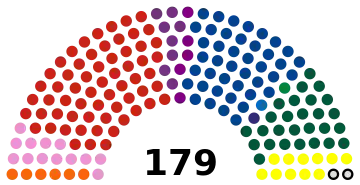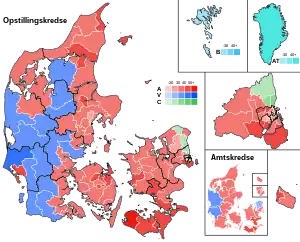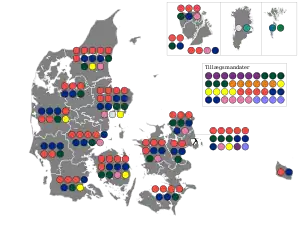| ||||||||||||||||||||||||||||||||||||||||||||||||||||||||||||||||||||||||||||||||||||||
All 179 seats in the Folketing 90 seats needed for a majority | ||||||||||||||||||||||||||||||||||||||||||||||||||||||||||||||||||||||||||||||||||||||
| Turnout | 84.25% | |||||||||||||||||||||||||||||||||||||||||||||||||||||||||||||||||||||||||||||||||||||
|---|---|---|---|---|---|---|---|---|---|---|---|---|---|---|---|---|---|---|---|---|---|---|---|---|---|---|---|---|---|---|---|---|---|---|---|---|---|---|---|---|---|---|---|---|---|---|---|---|---|---|---|---|---|---|---|---|---|---|---|---|---|---|---|---|---|---|---|---|---|---|---|---|---|---|---|---|---|---|---|---|---|---|---|---|---|---|
This lists parties that won seats. See the complete results below.
| ||||||||||||||||||||||||||||||||||||||||||||||||||||||||||||||||||||||||||||||||||||||
General elections were held in Denmark on 21 September 1994.[1] The coalition of the Social Democratic Party, the Danish Social Liberal Party and the Centre Democrats led by Poul Nyrup Rasmussen remained in power despite the Christian People's Party, which had been part of the government, failing to cross the 2% threshold and losing all four seats. Voter turnout was 84.3% in Denmark proper, 62.3% in the Faroe Islands and 56.7% in Greenland.[2]
Results
The sole elected independent MP in Denmark proper was Jacob Haugaard, who was associated with the Union of Conscientiously Work-Shy Elements. As of 2023, this is the only time an independent candidate has been elected to parliament under the current constitution. The re-election of the prime minister was also notable for being a rare example of Condorcet paradox observed on a country scale, discovered through prior opinion polls.[3]
 | |||||
|---|---|---|---|---|---|
| Party | Votes | % | Seats | +/– | |
| Denmark proper | |||||
| Social Democrats | 1,150,048 | 34.56 | 62 | –7 | |
| Venstre | 775,176 | 23.30 | 42 | +13 | |
| Conservative People's Party | 499,845 | 15.02 | 27 | –3 | |
| Socialist People's Party | 242,398 | 7.28 | 13 | –2 | |
| Progress Party | 214,057 | 6.43 | 11 | –1 | |
| Danish Social Liberal Party | 152,701 | 4.59 | 8 | +1 | |
| Red–Green Alliance | 104,701 | 3.15 | 6 | +6 | |
| Centre Democrats | 94,496 | 2.84 | 5 | –4 | |
| Christian People's Party | 61,507 | 1.85 | 0 | –4 | |
| Independents | 32,668 | 0.98 | 1 | +1 | |
| Total | 3,327,597 | 100.00 | 175 | 0 | |
| Valid votes | 3,327,597 | 99.02 | |||
| Invalid/blank votes | 33,040 | 0.98 | |||
| Total votes | 3,360,637 | 100.00 | |||
| Registered voters/turnout | 3,988,787 | 84.25 | |||
| Faroe Islands | |||||
| Union Party | 4,304 | 22.45 | 1 | +1 | |
| People's Party | 4,159 | 21.69 | 1 | 0 | |
| Social Democratic Party | 3,729 | 19.45 | 0 | –1 | |
| Workers' Union | 3,118 | 16.26 | 0 | New | |
| Republican Party | 1,798 | 9.38 | 0 | 0 | |
| Self-Government | 469 | 2.45 | 0 | 0 | |
| Christian People's Party | 467 | 2.44 | 0 | 0 | |
| Independents | 1,131 | 5.90 | 0 | New | |
| Total | 19,175 | 100.00 | 2 | 0 | |
| Valid votes | 19,175 | 99.47 | |||
| Invalid/blank votes | 103 | 0.53 | |||
| Total votes | 19,278 | 100.00 | |||
| Registered voters/turnout | 30,949 | 62.29 | |||
| Greenland | |||||
| Atassut | 7,501 | 34.73 | 1 | 0 | |
| Centre Party | 1,605 | 7.43 | 0 | New | |
| Independents | 12,489 | 57.83 | 1 | +1 | |
| Total | 21,595 | 100.00 | 2 | 0 | |
| Valid votes | 21,595 | 96.58 | |||
| Invalid/blank votes | 765 | 3.42 | |||
| Total votes | 22,360 | 100.00 | |||
| Registered voters/turnout | 38,113 | 58.67 | |||
| Source: Nohlen & Stöver | |||||
See also
References
- ↑ Dieter Nohlen & Philip Stöver (2010) Elections in Europe: A data handbook, p525 ISBN 978-3-8329-5609-7
- ↑ Nohlen & Stöver, p548
- ↑ Kurrild-Klitgaard, Peter (2014). "An empirical example of the Condorcet paradox of voting in a large electorate". Public Choice. 107: 135–145. doi:10.1023/A:1010304729545. ISSN 0048-5829. S2CID 152300013.

